New Zealand Palliative Care: Cultural, Ethical, and Legal Aspects
VerifiedAdded on 2023/03/31
|7
|1225
|348
Essay
AI Summary
This essay examines palliative care in New Zealand, focusing on the New Zealand Palliative Care Strategy and the importance of cultural competence, family-centered care, and person-centered practices. It highlights the significance of Maori cultural principles such as ‘Whānau’ and ‘Te Whare Tapa Whā’ in providing holistic care. The essay also addresses legal and ethical concerns, including enduring power of attorney and differing views on physician-assisted euthanasia. Key areas for improvement include respecting patient autonomy, normalizing discussions about dying, and promoting evidence-based practice with cultural sensitivity. The success of palliative care in New Zealand relies on culturally sensitive, person-centered approaches that respect family values.
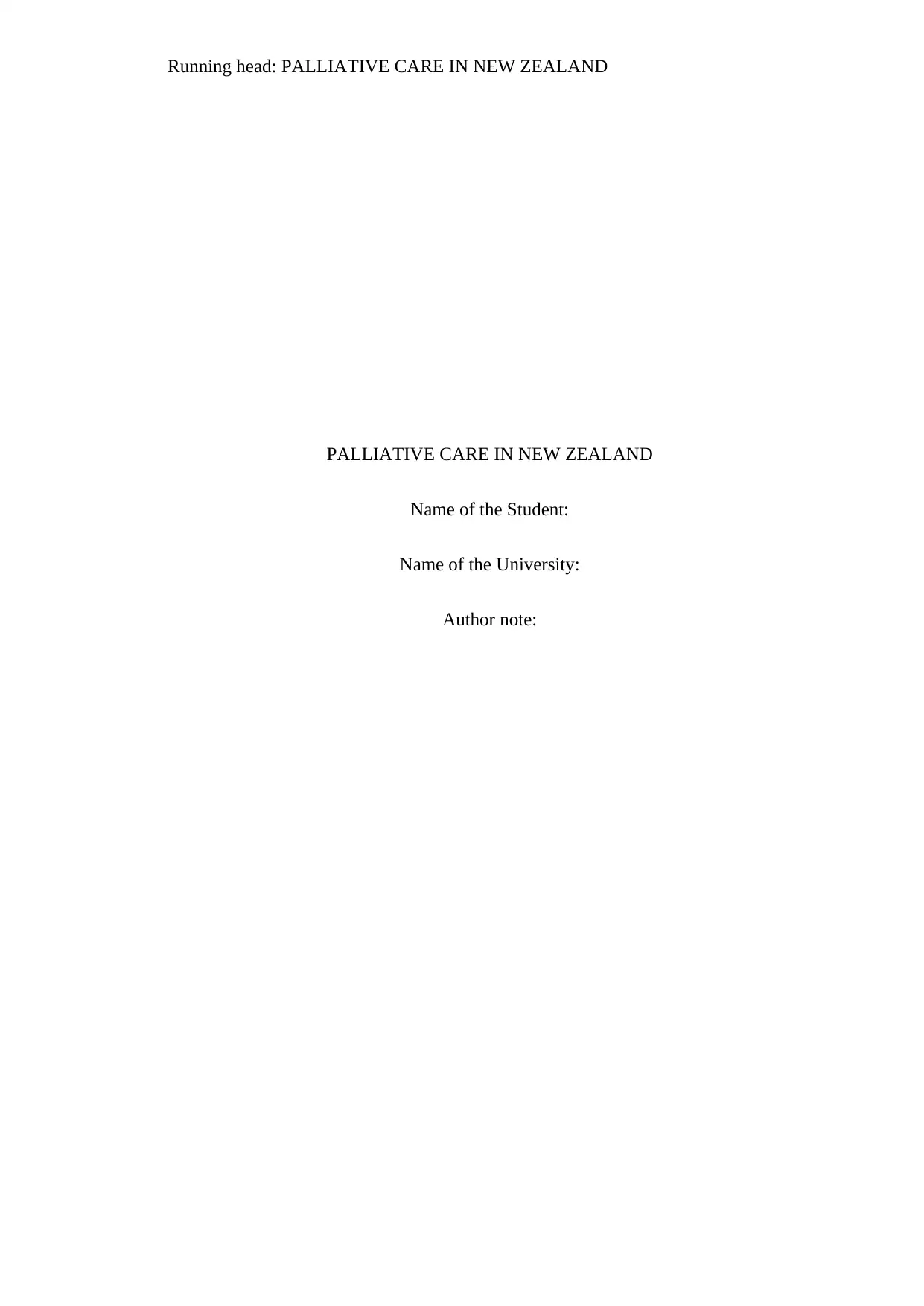
Running head: PALLIATIVE CARE IN NEW ZEALAND
PALLIATIVE CARE IN NEW ZEALAND
Name of the Student:
Name of the University:
Author note:
PALLIATIVE CARE IN NEW ZEALAND
Name of the Student:
Name of the University:
Author note:
Paraphrase This Document
Need a fresh take? Get an instant paraphrase of this document with our AI Paraphraser
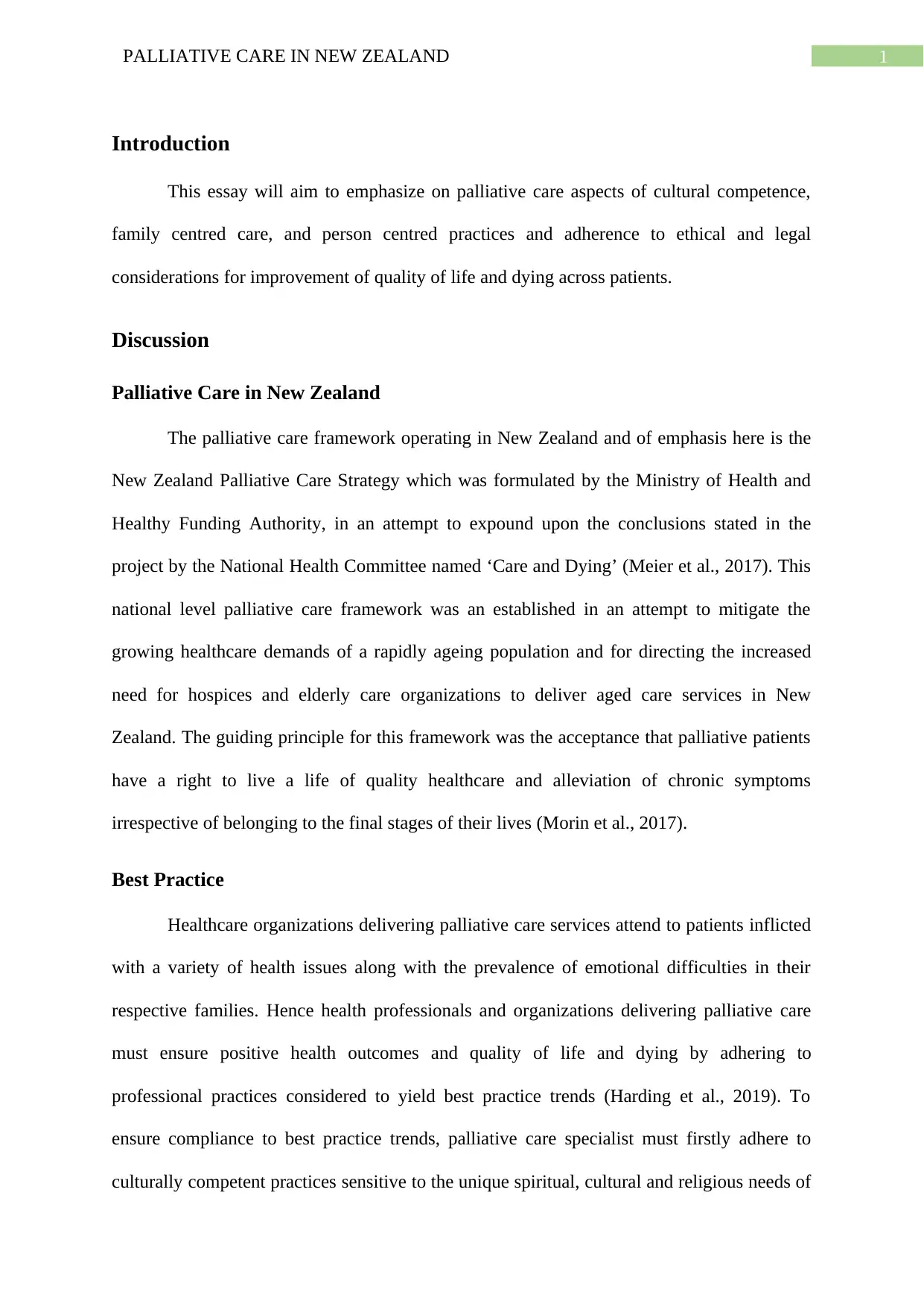
1PALLIATIVE CARE IN NEW ZEALAND
Introduction
This essay will aim to emphasize on palliative care aspects of cultural competence,
family centred care, and person centred practices and adherence to ethical and legal
considerations for improvement of quality of life and dying across patients.
Discussion
Palliative Care in New Zealand
The palliative care framework operating in New Zealand and of emphasis here is the
New Zealand Palliative Care Strategy which was formulated by the Ministry of Health and
Healthy Funding Authority, in an attempt to expound upon the conclusions stated in the
project by the National Health Committee named ‘Care and Dying’ (Meier et al., 2017). This
national level palliative care framework was an established in an attempt to mitigate the
growing healthcare demands of a rapidly ageing population and for directing the increased
need for hospices and elderly care organizations to deliver aged care services in New
Zealand. The guiding principle for this framework was the acceptance that palliative patients
have a right to live a life of quality healthcare and alleviation of chronic symptoms
irrespective of belonging to the final stages of their lives (Morin et al., 2017).
Best Practice
Healthcare organizations delivering palliative care services attend to patients inflicted
with a variety of health issues along with the prevalence of emotional difficulties in their
respective families. Hence health professionals and organizations delivering palliative care
must ensure positive health outcomes and quality of life and dying by adhering to
professional practices considered to yield best practice trends (Harding et al., 2019). To
ensure compliance to best practice trends, palliative care specialist must firstly adhere to
culturally competent practices sensitive to the unique spiritual, cultural and religious needs of
Introduction
This essay will aim to emphasize on palliative care aspects of cultural competence,
family centred care, and person centred practices and adherence to ethical and legal
considerations for improvement of quality of life and dying across patients.
Discussion
Palliative Care in New Zealand
The palliative care framework operating in New Zealand and of emphasis here is the
New Zealand Palliative Care Strategy which was formulated by the Ministry of Health and
Healthy Funding Authority, in an attempt to expound upon the conclusions stated in the
project by the National Health Committee named ‘Care and Dying’ (Meier et al., 2017). This
national level palliative care framework was an established in an attempt to mitigate the
growing healthcare demands of a rapidly ageing population and for directing the increased
need for hospices and elderly care organizations to deliver aged care services in New
Zealand. The guiding principle for this framework was the acceptance that palliative patients
have a right to live a life of quality healthcare and alleviation of chronic symptoms
irrespective of belonging to the final stages of their lives (Morin et al., 2017).
Best Practice
Healthcare organizations delivering palliative care services attend to patients inflicted
with a variety of health issues along with the prevalence of emotional difficulties in their
respective families. Hence health professionals and organizations delivering palliative care
must ensure positive health outcomes and quality of life and dying by adhering to
professional practices considered to yield best practice trends (Harding et al., 2019). To
ensure compliance to best practice trends, palliative care specialist must firstly adhere to
culturally competent practices sensitive to the unique spiritual, cultural and religious needs of
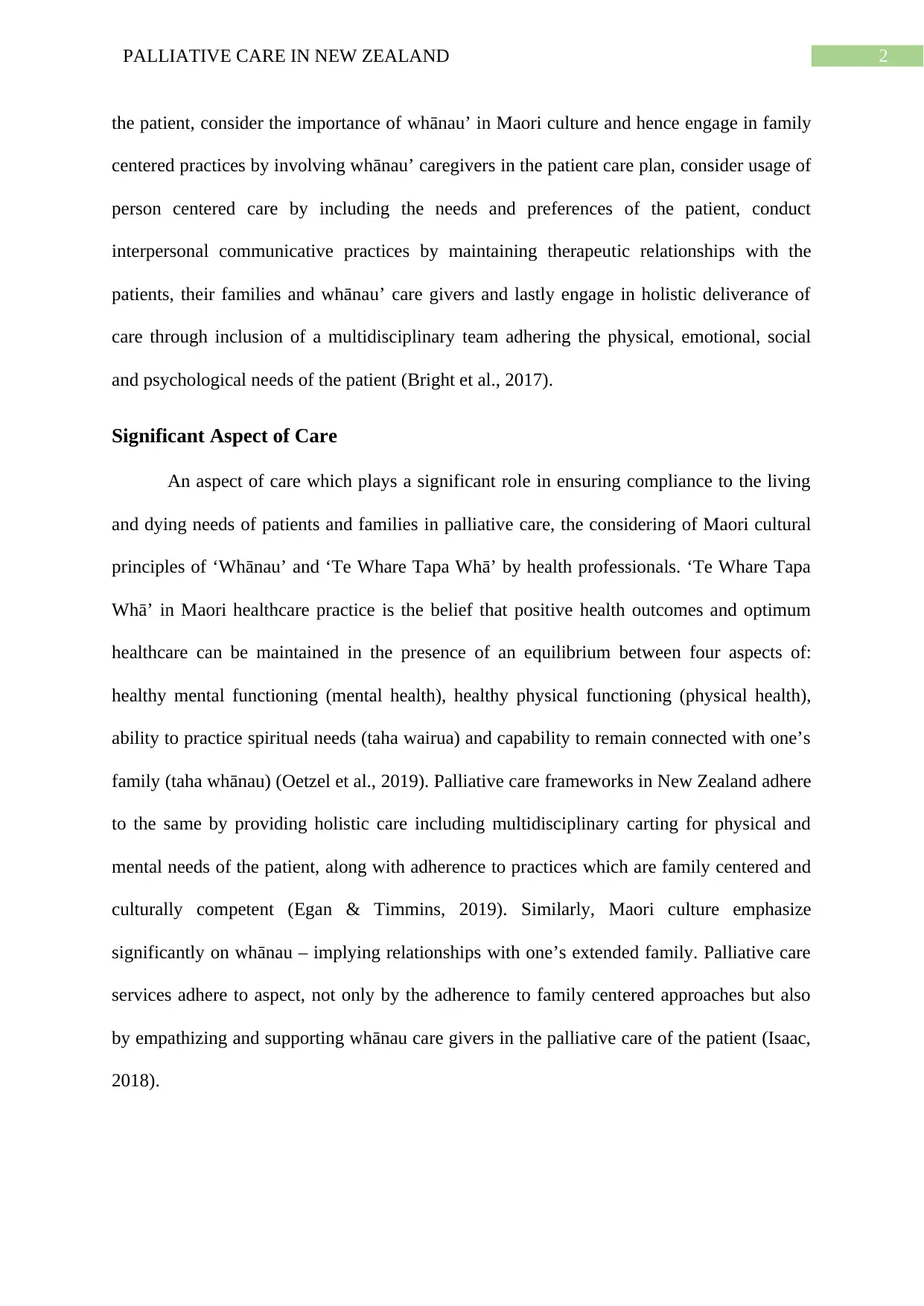
2PALLIATIVE CARE IN NEW ZEALAND
the patient, consider the importance of whānau’ in Maori culture and hence engage in family
centered practices by involving whānau’ caregivers in the patient care plan, consider usage of
person centered care by including the needs and preferences of the patient, conduct
interpersonal communicative practices by maintaining therapeutic relationships with the
patients, their families and whānau’ care givers and lastly engage in holistic deliverance of
care through inclusion of a multidisciplinary team adhering the physical, emotional, social
and psychological needs of the patient (Bright et al., 2017).
Significant Aspect of Care
An aspect of care which plays a significant role in ensuring compliance to the living
and dying needs of patients and families in palliative care, the considering of Maori cultural
principles of ‘Whānau’ and ‘Te Whare Tapa Whā’ by health professionals. ‘Te Whare Tapa
Whā’ in Maori healthcare practice is the belief that positive health outcomes and optimum
healthcare can be maintained in the presence of an equilibrium between four aspects of:
healthy mental functioning (mental health), healthy physical functioning (physical health),
ability to practice spiritual needs (taha wairua) and capability to remain connected with one’s
family (taha whānau) (Oetzel et al., 2019). Palliative care frameworks in New Zealand adhere
to the same by providing holistic care including multidisciplinary carting for physical and
mental needs of the patient, along with adherence to practices which are family centered and
culturally competent (Egan & Timmins, 2019). Similarly, Maori culture emphasize
significantly on whānau – implying relationships with one’s extended family. Palliative care
services adhere to aspect, not only by the adherence to family centered approaches but also
by empathizing and supporting whānau care givers in the palliative care of the patient (Isaac,
2018).
the patient, consider the importance of whānau’ in Maori culture and hence engage in family
centered practices by involving whānau’ caregivers in the patient care plan, consider usage of
person centered care by including the needs and preferences of the patient, conduct
interpersonal communicative practices by maintaining therapeutic relationships with the
patients, their families and whānau’ care givers and lastly engage in holistic deliverance of
care through inclusion of a multidisciplinary team adhering the physical, emotional, social
and psychological needs of the patient (Bright et al., 2017).
Significant Aspect of Care
An aspect of care which plays a significant role in ensuring compliance to the living
and dying needs of patients and families in palliative care, the considering of Maori cultural
principles of ‘Whānau’ and ‘Te Whare Tapa Whā’ by health professionals. ‘Te Whare Tapa
Whā’ in Maori healthcare practice is the belief that positive health outcomes and optimum
healthcare can be maintained in the presence of an equilibrium between four aspects of:
healthy mental functioning (mental health), healthy physical functioning (physical health),
ability to practice spiritual needs (taha wairua) and capability to remain connected with one’s
family (taha whānau) (Oetzel et al., 2019). Palliative care frameworks in New Zealand adhere
to the same by providing holistic care including multidisciplinary carting for physical and
mental needs of the patient, along with adherence to practices which are family centered and
culturally competent (Egan & Timmins, 2019). Similarly, Maori culture emphasize
significantly on whānau – implying relationships with one’s extended family. Palliative care
services adhere to aspect, not only by the adherence to family centered approaches but also
by empathizing and supporting whānau care givers in the palliative care of the patient (Isaac,
2018).
⊘ This is a preview!⊘
Do you want full access?
Subscribe today to unlock all pages.

Trusted by 1+ million students worldwide
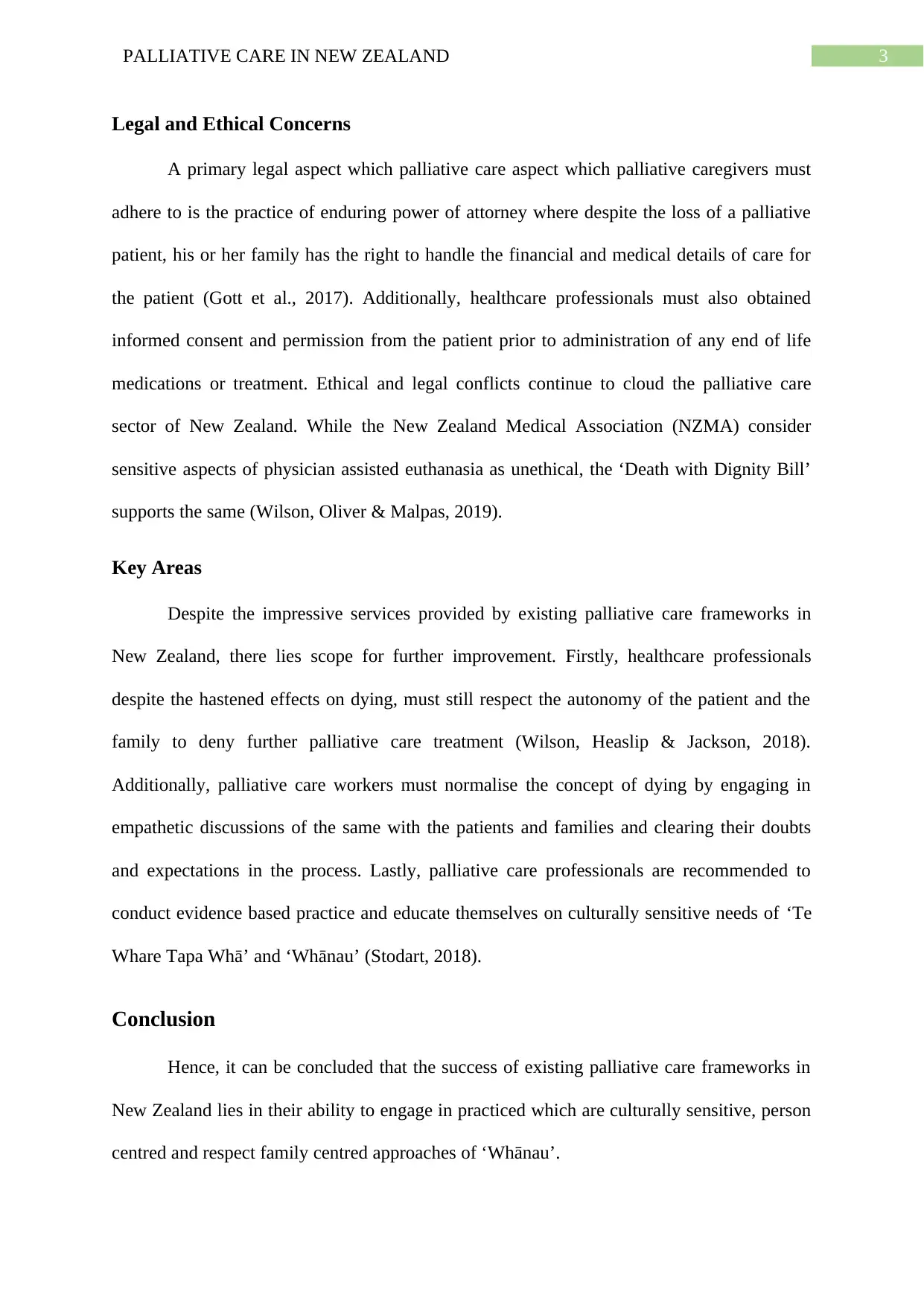
3PALLIATIVE CARE IN NEW ZEALAND
Legal and Ethical Concerns
A primary legal aspect which palliative care aspect which palliative caregivers must
adhere to is the practice of enduring power of attorney where despite the loss of a palliative
patient, his or her family has the right to handle the financial and medical details of care for
the patient (Gott et al., 2017). Additionally, healthcare professionals must also obtained
informed consent and permission from the patient prior to administration of any end of life
medications or treatment. Ethical and legal conflicts continue to cloud the palliative care
sector of New Zealand. While the New Zealand Medical Association (NZMA) consider
sensitive aspects of physician assisted euthanasia as unethical, the ‘Death with Dignity Bill’
supports the same (Wilson, Oliver & Malpas, 2019).
Key Areas
Despite the impressive services provided by existing palliative care frameworks in
New Zealand, there lies scope for further improvement. Firstly, healthcare professionals
despite the hastened effects on dying, must still respect the autonomy of the patient and the
family to deny further palliative care treatment (Wilson, Heaslip & Jackson, 2018).
Additionally, palliative care workers must normalise the concept of dying by engaging in
empathetic discussions of the same with the patients and families and clearing their doubts
and expectations in the process. Lastly, palliative care professionals are recommended to
conduct evidence based practice and educate themselves on culturally sensitive needs of ‘Te
Whare Tapa Whā’ and ‘Whānau’ (Stodart, 2018).
Conclusion
Hence, it can be concluded that the success of existing palliative care frameworks in
New Zealand lies in their ability to engage in practiced which are culturally sensitive, person
centred and respect family centred approaches of ‘Whānau’.
Legal and Ethical Concerns
A primary legal aspect which palliative care aspect which palliative caregivers must
adhere to is the practice of enduring power of attorney where despite the loss of a palliative
patient, his or her family has the right to handle the financial and medical details of care for
the patient (Gott et al., 2017). Additionally, healthcare professionals must also obtained
informed consent and permission from the patient prior to administration of any end of life
medications or treatment. Ethical and legal conflicts continue to cloud the palliative care
sector of New Zealand. While the New Zealand Medical Association (NZMA) consider
sensitive aspects of physician assisted euthanasia as unethical, the ‘Death with Dignity Bill’
supports the same (Wilson, Oliver & Malpas, 2019).
Key Areas
Despite the impressive services provided by existing palliative care frameworks in
New Zealand, there lies scope for further improvement. Firstly, healthcare professionals
despite the hastened effects on dying, must still respect the autonomy of the patient and the
family to deny further palliative care treatment (Wilson, Heaslip & Jackson, 2018).
Additionally, palliative care workers must normalise the concept of dying by engaging in
empathetic discussions of the same with the patients and families and clearing their doubts
and expectations in the process. Lastly, palliative care professionals are recommended to
conduct evidence based practice and educate themselves on culturally sensitive needs of ‘Te
Whare Tapa Whā’ and ‘Whānau’ (Stodart, 2018).
Conclusion
Hence, it can be concluded that the success of existing palliative care frameworks in
New Zealand lies in their ability to engage in practiced which are culturally sensitive, person
centred and respect family centred approaches of ‘Whānau’.
Paraphrase This Document
Need a fresh take? Get an instant paraphrase of this document with our AI Paraphraser

4PALLIATIVE CARE IN NEW ZEALAND
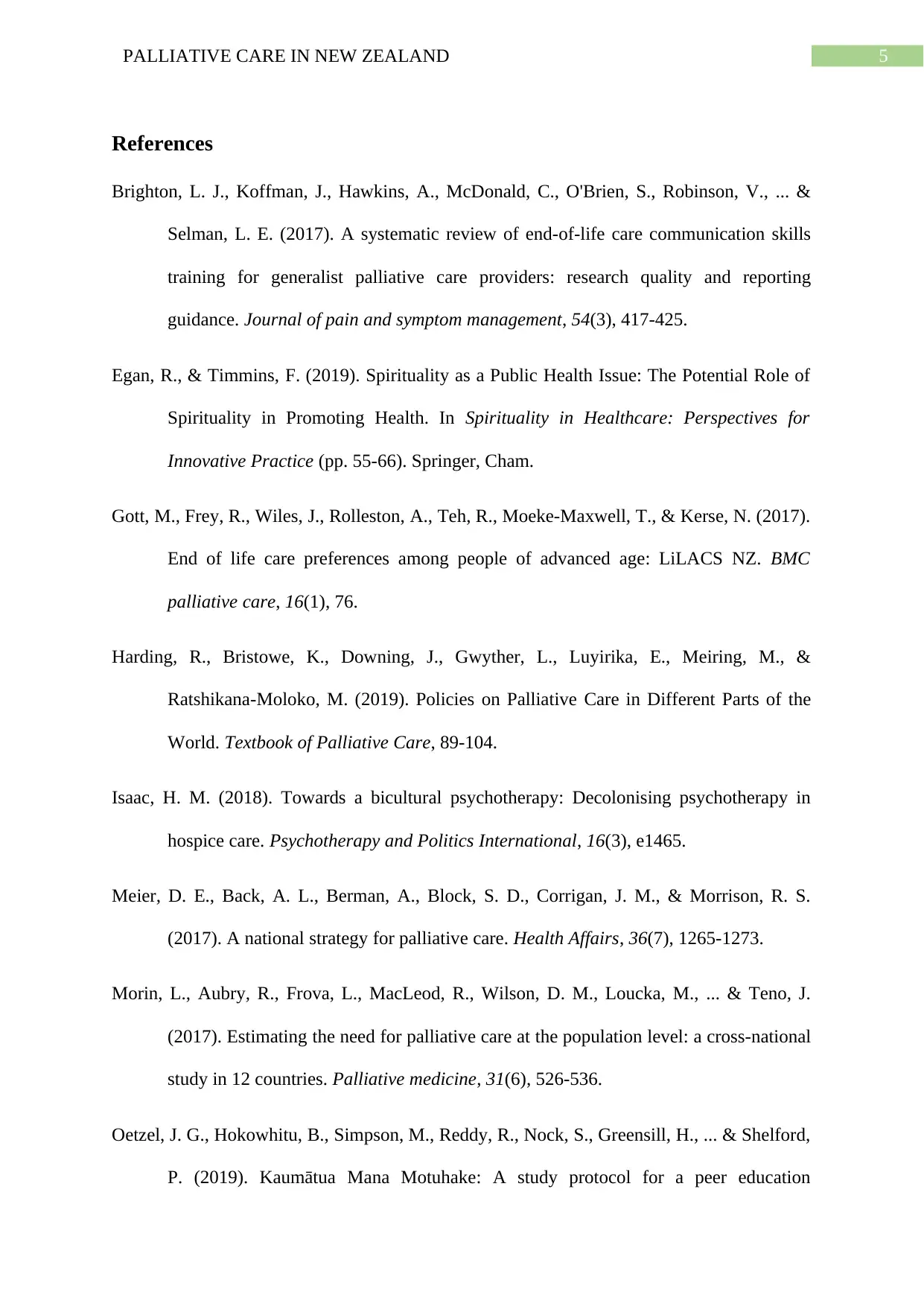
5PALLIATIVE CARE IN NEW ZEALAND
References
Brighton, L. J., Koffman, J., Hawkins, A., McDonald, C., O'Brien, S., Robinson, V., ... &
Selman, L. E. (2017). A systematic review of end-of-life care communication skills
training for generalist palliative care providers: research quality and reporting
guidance. Journal of pain and symptom management, 54(3), 417-425.
Egan, R., & Timmins, F. (2019). Spirituality as a Public Health Issue: The Potential Role of
Spirituality in Promoting Health. In Spirituality in Healthcare: Perspectives for
Innovative Practice (pp. 55-66). Springer, Cham.
Gott, M., Frey, R., Wiles, J., Rolleston, A., Teh, R., Moeke-Maxwell, T., & Kerse, N. (2017).
End of life care preferences among people of advanced age: LiLACS NZ. BMC
palliative care, 16(1), 76.
Harding, R., Bristowe, K., Downing, J., Gwyther, L., Luyirika, E., Meiring, M., &
Ratshikana-Moloko, M. (2019). Policies on Palliative Care in Different Parts of the
World. Textbook of Palliative Care, 89-104.
Isaac, H. M. (2018). Towards a bicultural psychotherapy: Decolonising psychotherapy in
hospice care. Psychotherapy and Politics International, 16(3), e1465.
Meier, D. E., Back, A. L., Berman, A., Block, S. D., Corrigan, J. M., & Morrison, R. S.
(2017). A national strategy for palliative care. Health Affairs, 36(7), 1265-1273.
Morin, L., Aubry, R., Frova, L., MacLeod, R., Wilson, D. M., Loucka, M., ... & Teno, J.
(2017). Estimating the need for palliative care at the population level: a cross-national
study in 12 countries. Palliative medicine, 31(6), 526-536.
Oetzel, J. G., Hokowhitu, B., Simpson, M., Reddy, R., Nock, S., Greensill, H., ... & Shelford,
P. (2019). Kaumātua Mana Motuhake: A study protocol for a peer education
References
Brighton, L. J., Koffman, J., Hawkins, A., McDonald, C., O'Brien, S., Robinson, V., ... &
Selman, L. E. (2017). A systematic review of end-of-life care communication skills
training for generalist palliative care providers: research quality and reporting
guidance. Journal of pain and symptom management, 54(3), 417-425.
Egan, R., & Timmins, F. (2019). Spirituality as a Public Health Issue: The Potential Role of
Spirituality in Promoting Health. In Spirituality in Healthcare: Perspectives for
Innovative Practice (pp. 55-66). Springer, Cham.
Gott, M., Frey, R., Wiles, J., Rolleston, A., Teh, R., Moeke-Maxwell, T., & Kerse, N. (2017).
End of life care preferences among people of advanced age: LiLACS NZ. BMC
palliative care, 16(1), 76.
Harding, R., Bristowe, K., Downing, J., Gwyther, L., Luyirika, E., Meiring, M., &
Ratshikana-Moloko, M. (2019). Policies on Palliative Care in Different Parts of the
World. Textbook of Palliative Care, 89-104.
Isaac, H. M. (2018). Towards a bicultural psychotherapy: Decolonising psychotherapy in
hospice care. Psychotherapy and Politics International, 16(3), e1465.
Meier, D. E., Back, A. L., Berman, A., Block, S. D., Corrigan, J. M., & Morrison, R. S.
(2017). A national strategy for palliative care. Health Affairs, 36(7), 1265-1273.
Morin, L., Aubry, R., Frova, L., MacLeod, R., Wilson, D. M., Loucka, M., ... & Teno, J.
(2017). Estimating the need for palliative care at the population level: a cross-national
study in 12 countries. Palliative medicine, 31(6), 526-536.
Oetzel, J. G., Hokowhitu, B., Simpson, M., Reddy, R., Nock, S., Greensill, H., ... & Shelford,
P. (2019). Kaumātua Mana Motuhake: A study protocol for a peer education
⊘ This is a preview!⊘
Do you want full access?
Subscribe today to unlock all pages.

Trusted by 1+ million students worldwide
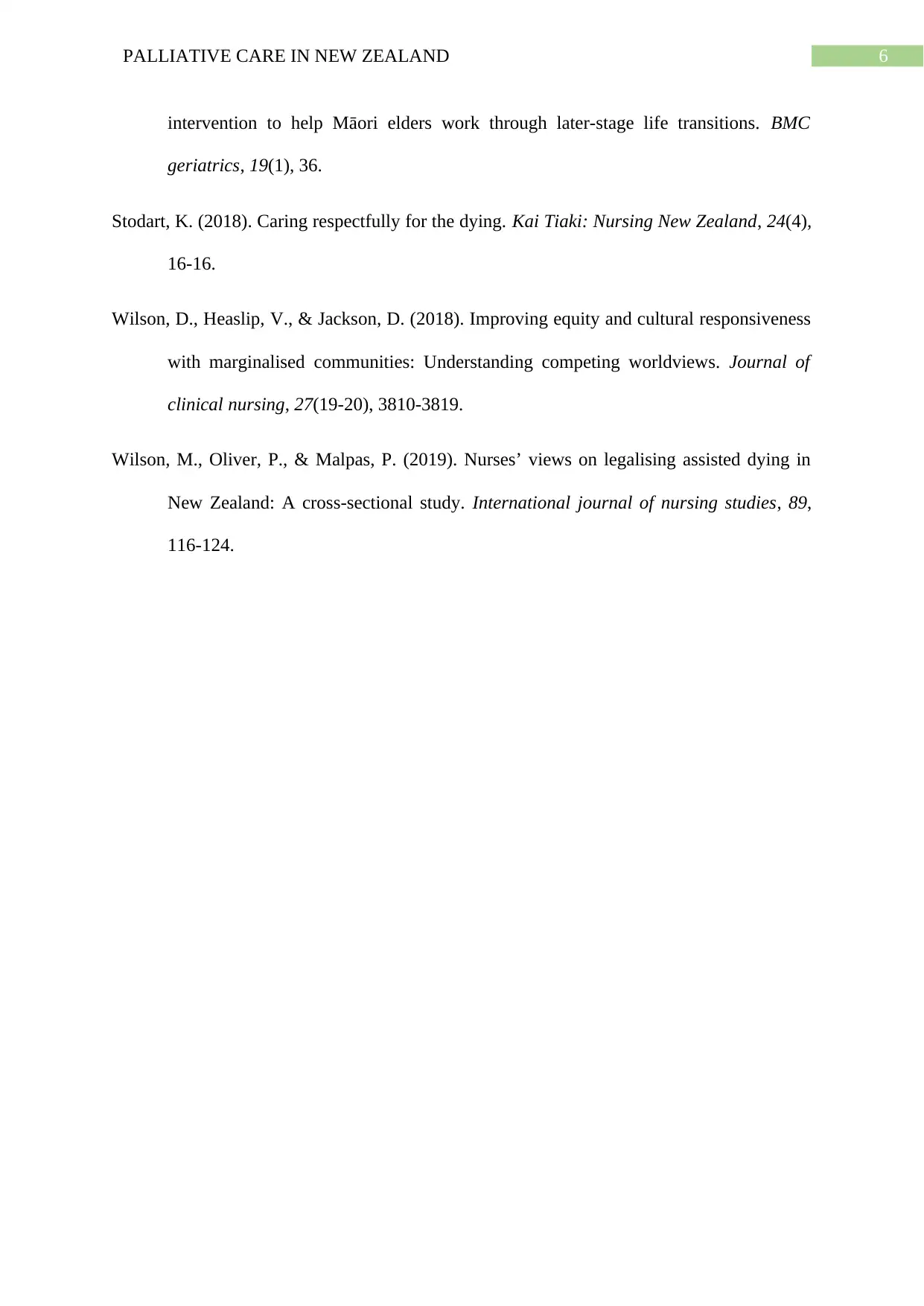
6PALLIATIVE CARE IN NEW ZEALAND
intervention to help Māori elders work through later-stage life transitions. BMC
geriatrics, 19(1), 36.
Stodart, K. (2018). Caring respectfully for the dying. Kai Tiaki: Nursing New Zealand, 24(4),
16-16.
Wilson, D., Heaslip, V., & Jackson, D. (2018). Improving equity and cultural responsiveness
with marginalised communities: Understanding competing worldviews. Journal of
clinical nursing, 27(19-20), 3810-3819.
Wilson, M., Oliver, P., & Malpas, P. (2019). Nurses’ views on legalising assisted dying in
New Zealand: A cross-sectional study. International journal of nursing studies, 89,
116-124.
intervention to help Māori elders work through later-stage life transitions. BMC
geriatrics, 19(1), 36.
Stodart, K. (2018). Caring respectfully for the dying. Kai Tiaki: Nursing New Zealand, 24(4),
16-16.
Wilson, D., Heaslip, V., & Jackson, D. (2018). Improving equity and cultural responsiveness
with marginalised communities: Understanding competing worldviews. Journal of
clinical nursing, 27(19-20), 3810-3819.
Wilson, M., Oliver, P., & Malpas, P. (2019). Nurses’ views on legalising assisted dying in
New Zealand: A cross-sectional study. International journal of nursing studies, 89,
116-124.
1 out of 7
Related Documents
Your All-in-One AI-Powered Toolkit for Academic Success.
+13062052269
info@desklib.com
Available 24*7 on WhatsApp / Email
![[object Object]](/_next/static/media/star-bottom.7253800d.svg)
Unlock your academic potential
Copyright © 2020–2026 A2Z Services. All Rights Reserved. Developed and managed by ZUCOL.





